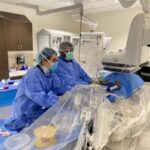Dreaming
We are in the throes of change in healthcare. I found an article written many years ago that was future facing and spoke to some changes that we were supposed to be seeing in healthcare. Things like a vaccine against the common cold (2009), human cloning (2009), genetic therapy (2014), most diseases treated at home (2020) and, by 2030, cancer, and heart disease will be wiped out.
I am not sure about most of these predictions, but some almost came true! That got me to thinking, “what are futurists saying is the updated vision of the future of healthcare?” Let’s take a few minutes and see.
The University of California San Francisco sees in the year 2050 game-changing predictions that include universal healthcare for all Americans, a pill to treat obesity, oral male contraceptives, lab-grown organs, AIDS eradication, and interoperability solved (yes, in 2050). Unfortunately, pandemics wiping out millions and superbugs proliferating are also in their future.
While I hope I am still here in 2050 and enjoying all the benefits of this new medical reality, let’s look a little closer to home, say, 2030. I am much more comfortable with these predictions as I can see a clear path to them coming true.
Wearable technology measuring bodily functions becomes more generally available and more affordable. Look at the number of people who already wear wristwatches (1 in 3) that monitor several body functions. The current number of add-ons to your smart phones that allow you to do more advanced at-home monitoring. In the near future, these devices will also routinely monitor body temperature and blood oxygen levels.
Genetic testing and genomic profiling will be widely used to identify inherited mutations and the genomic profiling will be looking for things that you picked up along the way that have nothing to do with your heredity.
Telehealth, I will say no more. The COVID-19 pandemic has identified the need for us to continue to refine how healthcare can be delivered virtually.
All these devices are collecting information and we are going to learn how to use it to our community advantage. How to improve treatment methods, how to alert the general community about health risks, these benefits are all coming.
Finally, the ultimate benefit of all this technology and data analysis is an improvement in health outcome. With better data and analysis, treatments modalities will be more individually prescribed with the additional benefit of making healthcare more cost effective (best treatment modalities the first time).
I saw another article that was “on the edge” but is likely going to be in our George Jetson future (Google it). It said, “A microscopic robot is implanted inside your daughter at birth. Whenever an illness begins, before she feels a symptom, it sends alerts to you and her doctor. Immediately the doctor prescribes genome-based drug therapies concocted for her biology and sends the medication to you by drone. Your health is also monitored by sensory equipment connected to remote specialists. Before you can feel a cancer symptom or travel to a distant hospital for a CT scan or MRI, nanobots collect tissue samples, replace damaged cells with healthy cells and absorb any toxins in your blood. Even your elderly father with Parkinson’s no longer needs to be taken to his neurologist’s office; internal nanobots discharge dopamine in a specific location in his brain.” Say it is so!




























